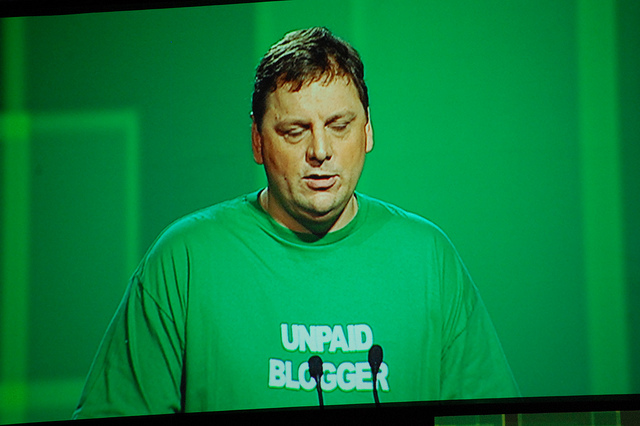“Online bloggers and tweters are not subject to the financial incentives which affect the print media.”
While there’s much to disagree with in Lord Justice Leveson’s Australian speeches last week, particularly the bizarre suggestion that bloggers and social media are driving the decline in journalistic standards, he is correct about the economics of online publishing. It’s tough to make a buck on the web.
It’s so tough, many of the new media startups are founded on not paying for the articles they publish. This model has become so entrenched, that some venture capital investors will only invest in media start ups if they don’t have any reporters or editors.
Pure platforms
New media startup Buzzfeed‘s founder, Jonah Peretti, mentioned Silicon Valley’s reluctant to pay writers in a staff email republished by Chris Dixon;
Tech investors prefer pure platform companies because you can just focus on the tech, have the users produce the content for free, and scale the business globally without having to hire many people.
This antithesis to paying creatives and content creators is one of the notable aspects of the current Silicon Valley model, who needs editors and writers when a billion people will post to Facebook, Twitter or Instagram?
Arianna Huffington has been the most successful with this model in the media industry, parlaying a largely unpaid for content business into a fat pay-off. Chris Anderson described this model best in a description of his website Geek Dad’s economics.
Reading the comments
For readers, much of the value in sites like the Huffington Post and Geek Dad lie in the comments stream where readers give their views and experiences and build the communities so many investors and advertisers are looking for.
This is a point made by Rachel Hills when commenting about Australian website Mamamia’s payment policies;
When I visit Mamamia. I don’t go to Mamamia for the articles, which usually don’t tell me anything I haven’t already read somewhere else. I go for the comments.
Rachel concludes with the thought that Mia Freedman’s Mamamia is providing a platform for discussion. This is true, but that’s no different from newspapers, the six o’clock news, current affairs shows or even the weekend’s football match.
Those football players, newsreaders and journalists are all paid for their work, just like Chris Anderson and Mia Freedman were as magazine editors.
The hypocrisy of unpaid content
Which leads us to the core hypocrisy of the unpaid content model; its promoters – people like Mia Freedman, Chris Anderson and Arianna Huffington – have all been well paid in their careers yet now choose to deny the next generation of writers and journalist an income.
A business adviser once remarked to me that the management of a corporation that were locking in their entitlements while cutting middle management were “pulling up the drawbridge”, that line seems apt as older, affluent journalists demand younger ones work as unpaid contributors or interns.
The bleat from online publishers is “we can’t afford to pay contributors”, in most other industries being able to pay your workers is a measure of whether your business is solvent. That many new media outlets can’t may mean that the entire industry is insolvent.
Writers get exposure
Were the local cafe to say it couldn’t afford to pay its waitstaff, but it was giving them valuable work experience they’d be rightly scorned for exploiting workers. There’s little difference with online publishers.
It may well be because there is no shortage of manipulative, attention grabbing garbage designed to provoke reactions and increase pageviews, which is the flaw in the “writers get exposure” excuse used by many of these sites.
As middlemen, publishers have to add value in order to have a role, ‘offering exposure’ to unpaid writers isn’t a reason in itself. This is an industry with shaky foundations and it’s not surprising founders are desperately trying to find greater fools to fund their exits.
Image of Michael Arrington from Kevin Krejci on Flickr.

Leave a Reply